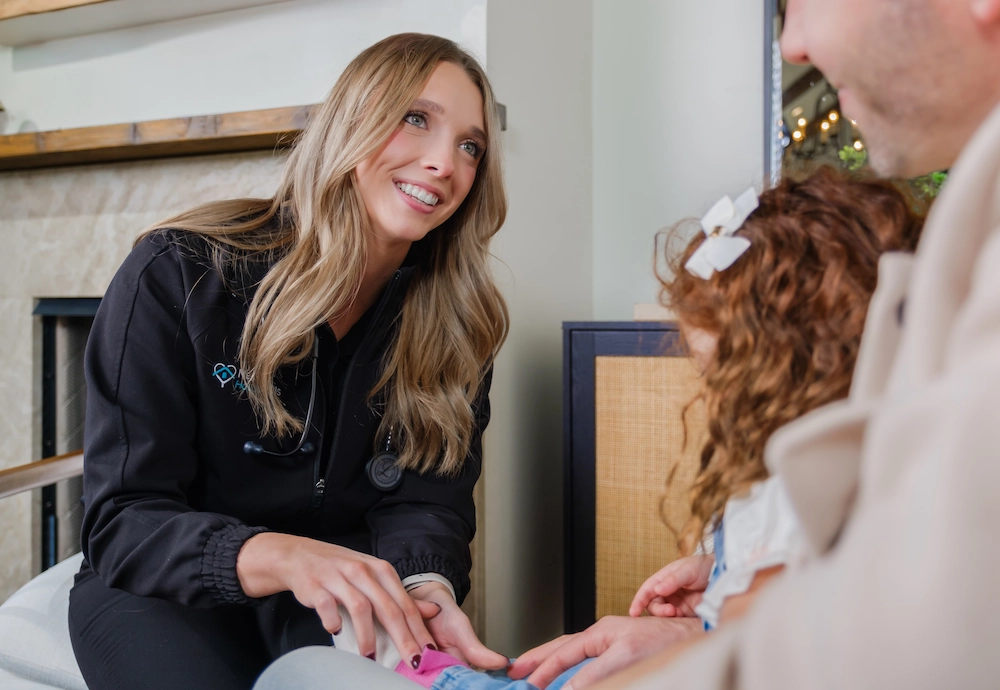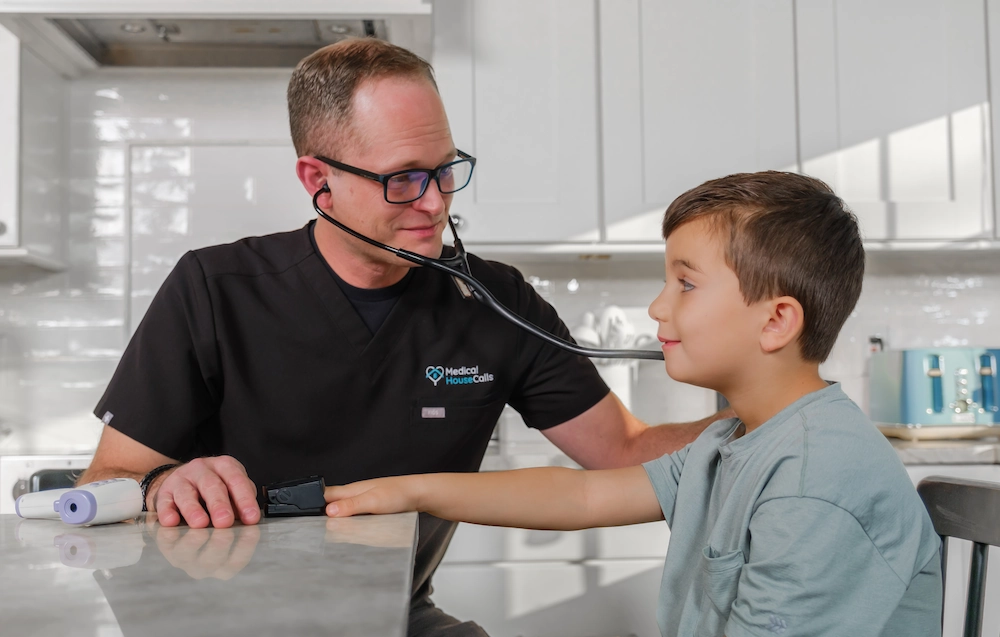Table of Contents
Beyond Band-Aids: What Makes Children Urgent Care Essential for Families
Children’s health can be unpredictable, with fevers, bumps, bruises, and infections that seem to appear out of nowhere. When these issues arise, knowing where to turn for the appropriate level of care is crucial. While emergency rooms are often associated with acute health concerns, Medical House Calls offer a practical, specialized option for non-life-threatening but urgent situations.
In this article, we’ll explore why Children Urgent Care is a vital resource, what services it provides, and when it’s best to utilize them.
Unlimited Urgent Care House Calls

Overview of Pediatric Urgent Care
Pediatric urgent care practitioners provide medical attention for children facing non-life-threatening health concerns. They fill the gap between routine care from a pediatrician and the burdensome environment of emergency rooms, offering care tailored to children’s needs. With a focus on child-friendly care, pediatric urgent care is often the ideal choice for addressing illnesses or minor injuries.
Importance of Pediatric Training in Urgent Care
Pediatric training is crucial for all healthcare professionals providing urgent care, whether in a clinic or through Medical House Calls. Trained in pediatrics, they understand the physical, developmental, and emotional needs of children, ensuring that care is delivered with precision and compassion.
This expertise is important as children are treated in their home environment, which can influence their behavior and comfort level. Pediatric-trained professionals are adept at making accurate diagnoses, calming anxious children, and communicating with parents or caregivers. This specialized training ensures that house-call services are not only convenient but also tailored to meet the needs of young patients.
Common Conditions Treated
Pediatric urgent care centers are equipped to handle assorted non-emergency medical issues such as:
- Fevers and cold symptoms
- Ear infections
- Minor cuts, bruises, and burns
- Allergic reactions (without severe symptoms)
- Sprains, minor fractures, and other orthopedic injuries
- Rashes and skin conditions
- Vomiting, diarrhea, and dehydration
Urgent Care vs. Emergency Room
Urgent care is suitable for conditions that require prompt attention but aren’t severe enough for an ER visit. This includes minor injuries, mild asthma attacks, or persistent fever.
In contrast, the emergency room is essential for life-threatening conditions, such as difficulty breathing, head injuries, heavy bleeding, seizures, or signs of a broken bone. Knowing which facility to turn to can save time, reduce stress, and ensure your child receives the best possible care.
Choosing Appropriate Urgent Care
With options ranging from traditional walk-in facilities to innovative at-home urgent care services, knowing what each offers can help.
At-Home Urgent Care vs. Traditional Facilities
- At-Home Urgent Care: This service brings medical professionals to your doorstep, providing convenience and personalized care in a familiar setting. It is beneficial for parents who want to minimize exposure to other illnesses or for children who might feel anxious in a clinical environment. However, availability may be limited, and some conditions may require equipment that is only available at traditional facilities.
- Traditional Urgent Care Clinics: These clinics offer services such as X-rays, lab testing, and minor surgical procedures. They are well-suited for handling a broad spectrum of urgent but non-emergency health issues. Many traditional centers are equipped with child-friendly waiting rooms, specialized pediatric staff, and on-site resources for faster diagnosis and treatment.

Preparing for an Urgent Care Visit
When scheduling the visit, confirm the service’s availability, discuss your child’s symptoms, and share relevant medical history. Have your child’s current medications, immunization records, and all necessary documents (such as insurance information) readily accessible.
To make the visit more comfortable, create a quiet, well-lit space where the examination can take place. Reassure your child about the upcoming visit, emphasizing that the doctor is coming to help them feel better. These steps can reduce stress and ensure the provider has everything they need to deliver personalized, high-quality care.
What to Expect During The Appointment
During a Medical House Call, one of our licensed healthcare providers will arrive at your home equipped to determine and address your child’s needs. The appointment begins with the provider reviewing your child’s symptoms, medical history, and concerns you’ve shared during scheduling. A physical examination will follow, during which the provider may check vital signs, examine the affected area, or perform diagnostic tests, such as a strep throat swab or flu test.
The home setting allows the medical professional to observe your child in a comfortable environment, which can ease anxiety and make the process smoother. Throughout the appointment, the provider will explain their findings, discuss the recommended treatment plan, and answer all questions you might have.
If medication is required, they may offer prescriptions or even provide certain treatments, depending on the nature of the condition. This personalized, at-home approach ensures your child receives thorough care without the added stress of a clinical setting.
Aftercare and Follow-Up Instructions
At the conclusion of a Medical House Call, our healthcare provider will recommend aftercare instructions tailored to your child’s condition. This may include guidelines for administering medications, managing symptoms, and recognizing signs that might require further attention. The provider will also ensure you know how to contact them if additional concerns arise.
If follow-up care is needed, the medical professional may recommend scheduling another house call, consulting with your child’s pediatrician, or referring to a specialist. Medical House Calls offer follow-up communication, such as phone or virtual check-ins, to monitor your child’s progress. By following these aftercare instructions and keeping communication open, you can ensure a smooth recovery and continued well-being for your child.
Insurance and Payment Options
Medical House Calls offers transparent, flat-fee, upfront pricing with no hidden fees. Our simple pricing sidesteps out-of-control healthcare costs and insurance hassles. The best part is that you can still use your out-of-network insurance benefits to put money back in your pocket.
Flexible payment methods, such as credit cards, health savings accounts (HSAs), or payment plans, are also available. Ensuring you understand these details in advance can help you prepare for a smooth billing experience and focus on your child’s care.
Parent Resources and Support Services
Medical House Call offers valuable resources to support parents throughout the care process. This may include access to educational materials, guidance on managing your child’s condition at home, and connections to specialists if further care is needed.
Our services provide direct communication options, such as follow-up calls or virtual consultations, to address lingering concerns after the visit. Additionally, our services collaborate with local organizations to connect families with broader health or wellness resources. These supportive tools empower parents to feel confident and informed while prioritizing their child’s health.
Medical House Calls offer a modern, convenient solution for addressing your child’s urgent care needs without the burden of traveling to a clinic. It is a practical choice for families seeking high-quality, compassionate care. By bringing healthcare to your doorstep, these services prioritize your child’s comfort and recovery, giving parents peace of mind and confidence in their care decisions.








